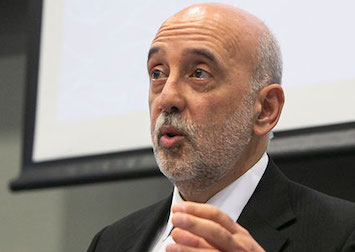By Mark McSherry — Central Bank of Ireland (CBI) governor Gabriel Makhlouf has warned that Ireland’s investment funds sector — in which assets under administration soared 87% to €5.6 trillion between 2016 and 2021 — is “too big to ignore” and that Ireland needs “to rethink the regulation” of the country’s non-bank sector.
“The financial system in Ireland is heavily weighted towards the non-bank sector,” said Makhlouf.
“The largest part of that sector is made up investment funds, money market funds and special purpose entities.
“We have the third largest funds sector in the world.
“To give you a sense of scale, by the end of 2021, there were nearly 10,000 such entities, up from about 6,000 in 2016.
“In the same period, asset values of these entities increased from approximately €3 trillion to €5.6 trillion.”
Makhlouf referenced the “systemic concerns” caused by Covid-related stress in March 2020 when a so-called “dash for cash” demonstrated “liquidity management vulnerabilities in the non-bank sector which required central bank intervention.”
He said more recent stress came from the leveraged position of so-called liability-driven investment funds (LDI), ultimately requiring a commitment of £65 billion worth of intervention by the UK’c central bank.
In a speech at the Financial System Conference, Makhlouf warned: “There is clearly hidden leverage, interconnectedness and channels of propagation that we do not yet fully understand, and vulnerabilities building-up in the non-bank sector.
“These knowledge and data gaps need addressing …”
Makhlouf explained: “In particular, in my view we need to rethink the regulation of the non-bank sector. And given the scale of the industry in Ireland, it is worth saying a few words specifically on investment funds.
“Traditionally, the regulation of investment funds has been largely about developing and enforcing investor protection rules.
“But we have to learn from history. The lessons of the global financial crisis, the Covid-induced market shock of March 2020, and the UK’s recent LDI issue are clear.
“The sector is too big to ignore. That’s self evident.
“The financial stability risks are self-evident.
“The risks to investors, consumers and the community as a whole are self-evident.
“The ‘dash for cash’ and LDI issue were ‘near misses’. They clearly show the systemic risk that funds can generate via their collective actions, as Nobel laureates Diamond and Dybvig told us.
“A stable financial system is a necessary pre-condition if we are to protect consumers and investors. And we – policymakers and regulators – need to accelerate steps to ensure that our frameworks do that in a comprehensive way.
“We need to be agile, forward-looking and connected as we look to address this.
“Over recent years we have played a leading role in international efforts to develop solutions to address financial stability risks in the funds sector. Where solutions are developed and available, we should move quickly to implementation.
“Here in Ireland, we are planning to introduce leverage limits for property funds connected to the domestic economy, but we cannot tackle the wider issue of systemic risk alone. Global and European coordination is needed here, and, I suggest, urgently.
“Regulators need to approach the issue by asking themselves how much stress it would take for different sectors to cause serious disruption to the financial system.
“As I said, consumer and investor protection is founded on the existence of a stable financial system and regulators need to be aware of the big picture, avoiding the temptation to focus on narrower and perhaps more straightforward ways of providing that protection.
“Tackling systemic risk requires a macroprudential perspective that targets the collective action of fund cohorts, not idiosyncratic risk management issues at individual funds.
“To put it another way, there are significant advantages in closing a stable door at the right time.
“There is clearly hidden leverage, interconnectedness and channels of propagation that we do not yet fully understand, and vulnerabilities building-up in the non-bank sector.
“These knowledge and data gaps need addressing …”
